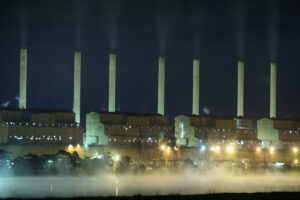Expensive, publicly-funded Carbon Capture & Storage is barely visible in new emissions data

Buried deep in Australia new emissions data release is this nugget, in the ‘revisions’ section:
“Fugitive sector emissions decreased 2.2% over the year to March 2025, mainly driven by reductions in natural gas venting emissions from new carbon capture and storage activities and a decline in production across both surface and underground coal mining. Estimates in this report include emission reductions from the Moomba Carbon Capture and Storage (CCS) project, which commenced operation in September 2024.”
One of my most unusual hobbies is collecting every single release of Australia’s emissions data in a file where I can compare each ‘version’ of data (this is how I can illustrate the size of the wild revisions to land-use data).
So, we can compare the new data to the old data and get a pretty accurate figure of exactly what benefit the Moomba CCS project actually had on Australia’s fugitive emissions:

Fugitive emissions were revised down for the March quarter by 0.5 megatonnes of carbon dioxide equivalent; 4% of fugitive emissions and 0.5% of Australia’s total emissions.
By contrast, in a single quarter, emissions in the power sector fell by more than four times that amount relative to the same quarter last year (thank you renewable energy).
The total volume of CO2 captured by Moomba in the first quarter of 2025 equates to around 4.6 days of Santos’ total corporate emissions, or 1.6 days worth of the total domestic emissions from Australia’s fossil fuel production industries.
Remember: Moomba received a massive $15 million grant from the Morrison government in 2021. That’s bad enough, but the operators of CCS are pushing for even more.
Carbon offsets for CCS
Only days before the election, the Barossa Offshore Gas project was granted the green light by Australia’s National Offshore Petroleum Safety and Environmental Management Authority (NOPSEMA).
The ‘Safeguard Mechanism’ plays a major role in easing the approval of new gas projects, because it allows high-emitting companies to be under their emissions limits.
Not by emitting less, but by claiming to have used carbon offsets. The Australia Institute has been raising the alarm on this scheme for a long time.
The document that Barossa’s owner Santos submitted to NOPSEMA -a 1,610 page PDF environment plan – gives us some insights into how new gas relies on carbon offsetting to seek approval.
Companies like Santos aren’t relying on a large number of offsets (“Australian Carbon Credit Units”, or ACCUs) being available far into the future:
“The responsible Commonwealth minister has communicated to the Barossa joint venture partners on a number of occasions that he anticipates there being ACCUs available for this project…..the availability of ACCUs over the next decade is supported by analysis of the balance between supply, holdings, and cancellation rates (RepuTex Energy, 2024). Throughout the decade, ACCU supply is projected to steadily increase, surpassing 30 million annually by 2030, alongside rising cancellation rates to meet Safeguard Mechanism requirements”
Santos lays out that it’s going to be generating its own carbon offset, through a controversial new method:
“As noted above, Santos is already generating some of its own emissions reduction units (including ACCUs and SMCs) at the portfolio level. The Moomba CCS project completed commissioning in 2024 and is now operating and storing CO2 in depleted reservoirs of the Cooper Basin. This project has been registered with the CER as an ACCU generating project and is anticipated to commence generating ACCUs within 12 months as at February 2025”
Santos will face a material cost if it were to just buy carbon offsets from the open Australian market, for its newly approved Barossa gas field. But Santos will be generating and selling its own carbon offsets, too – all for carbon it should be capturing anyway, and that only serves as a tiny proportion of its rising emissions.
The Australian government needs to put a stop to new coal and gas projects, instead of granting operators new ways to shuffle pieces on the board, and CCS offsets simply shouldn’t exist.
Between the Lines Newsletter
The biggest stories and the best analysis from the team at the Australia Institute, delivered to your inbox every fortnight.
You might also like
Climate target malpractice. Cooking the books and cooking the planet.
As the Albanese government prepares to announce Australia’s 2035 climate target, pressure is mounting to show greater ambition.
New data reveals the abject failure of a project which cost taxpayers $15 million
New emissions data reveals the abject failure of an overhyped carbon capture and storage (CCS) project, which cost Australian taxpayers $15 million.
Why a fossil fuel-free COP could put Australia’s bid over the edge
When the medical world hosts a conference on quitting smoking, they don’t invite Phillip Morris, or British American Tobacco along to help “be part of the solution”.


